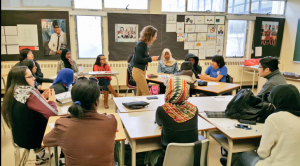
EJS Clinic Student Netta Untershats leading a group discussion on community perspectives in environmental decision-making with Grade 10 Students at C.W. Jefferys Collegiate Institute
I had the honour of interacting with youth from many parts of the world during my extensive teaching and summer camp experience prior to attending law school. I carried my teaching experience forward as a volunteer with the Law in Action Within Schools (LAWS) program, which seeks to “provide a positive and engaging exposure to legal issues, the justice system and the legal profession.” I sought to combine my positions as both a LAWS volunteer and a student of the Osgoode Environmental Justice and Sustainability Clinic to develop an Environmental Law Workshop for high school students at C.W. Jefferys Collegiate Institute.
A common theme I found in my discussions with high school students throughout my teaching experience was that government decisions, particularly related to the environment, were made by individuals who will not have to live with the consequences. In other words, the older generations are making crucial decisions about the environment that will have an impact on the lives of younger generations in the future. The United Nations has recognized the importance of the rights of children and youth generally and specifically in relation to their participation in environmental sustainability.
My students felt that youth should have a more active voice in decisions that will ultimately affect their future. This theme has been examined in the literature and one study in particular found that youth consistently ranked their participatory rights to be included in decision-making in society above their rights to safety and education.
With this theme in mind, I co-developed (with EJS Clinic student Nina Mazze '16) a workshop on the Ontario Environmental Bill of Rights as a tool to empower today’s youth. The workshop engaged students in recognizing environmental legal issues, learning about their right to express their views, and participating in a group activity that examined various stakeholder perspectives. This workshop has not only established a partnership between the EJS Clinic and the LAWS program but, more importantly, has fostered and educated members of the next generation.
By educating high school students, we are empowering the community as a whole because we are giving a voice to the younger generation. David Boyd identified intergenerational collaboration in decision-making as a crucial element of environmental sustainability. By laying a strong foundation for younger generations to voice their concerns and become more informed about their rights, we are strengthening the community as a whole.
Public Legal Education and Information (PLEI) organizations have been established all across Canada and governments worldwide are beginning to see the benefits. Legal clinics, such as the EJS clinic, play an important role in assisting government efforts to provide the public with PLEI services. PLEI services assist in increasing access to justice, empowering the community, and recruiting a broader diversity of individuals into the legal profession. These services support the broader mandates of all the organizations I was involved with during this academic year – LAWS, EJS, and the Canadian Environmental Law Association (CELA). This pilot project of a PLEI workshop is an important step in establishing the EJS clinic’s goal of supporting the broader community.

